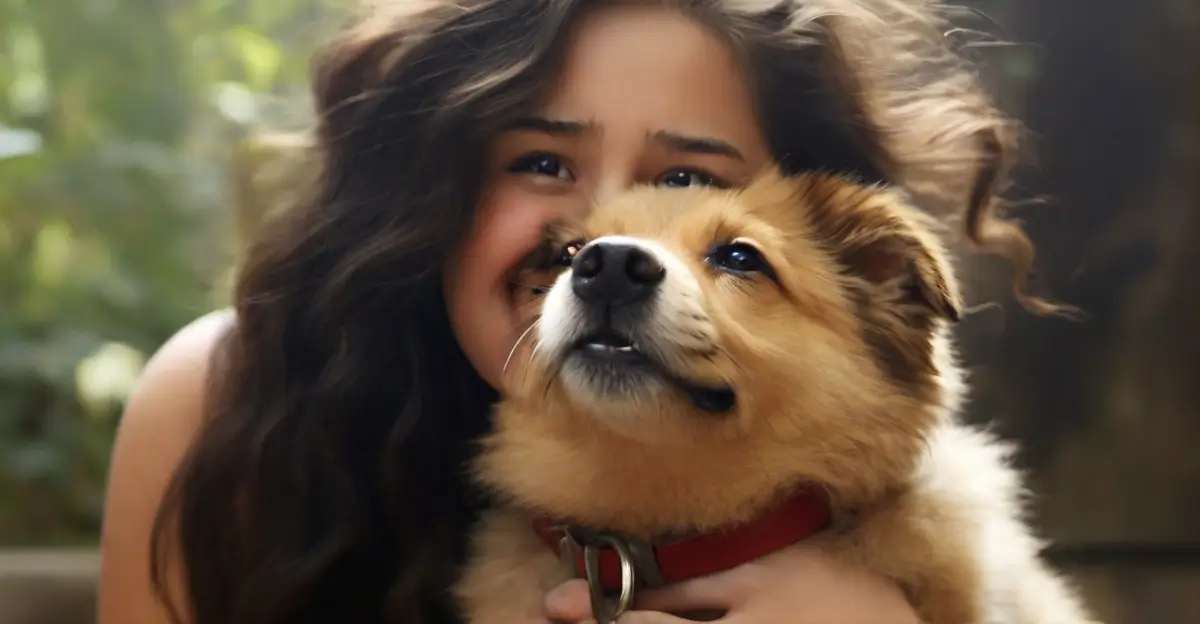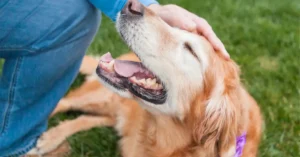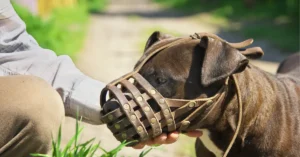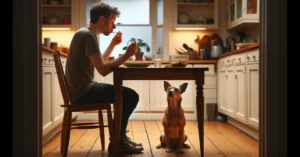Ever wondered why your dog biting on your hair? You’re not alone! Dogs are curious and use their mouths to explore, just like kids do. They might nibble on your hair as a way to show love or grab your attention. Understanding this can turn a confusing behavior into a bonding moment. We’ll explore the playful and affectionate reasons behind this, helping you get closer to your furry friend. By the end, you’ll know how to strengthen your bond and keep your pet happy and healthy. Let’s dive into understanding and improving our relationships with our beloved dogs together.
Decoding Your Furry Friend’s Behavior
Before diving into the specifics, let’s understand that dogs use their mouths much like we use our hands. They explore, communicate, and express emotions through this behavior, often focusing on something familiar and comforting, like their owners’ hair. Whether it’s a gentle nibble or a playful tug on their owner’s hair, each action has a meaning.
Let’s unravel these mysteries together, paying close attention to why a dog might choose their owner’s hair as a point of interest. To explore further reasons behind this behavior, it’s essential to delve deeper into the canine world, understanding their instincts, desires, and ways of interacting with those they trust and love.
A Playful Quest for Discovery
Imagine being a dog for a moment. The world is full of wonders, and your mouth is your main tool to explore. That’s exactly why dogs often bite their owner’s hair. It’s not just curiosity; it’s a way to learn about their environment. Puppies, especially, use this method to explore everything around them. Your hair’s unique scent and texture make it an irresistible mystery. When they chew on it, they’re not just playing; they’re understanding the world. It’s important to consider this natural curiosity and gently guide them towards more appropriate toys to satisfy their exploratory needs.
Craving Your Undivided Attention
Dogs are smart and quickly learn which actions will capture their owner’s attention. Biting the owner’s hair can be their method of communicating, “I need some time with you.” This behavior becomes especially noticeable when you’re busy, and your dog might feel neglected, seeing your hair as the ideal way to grab your focus. It’s crucial to acknowledge their desire for interaction.
Rather than reprimanding, it’s important to address this need positively by redirecting your dog’s attention with a toy or a game. This strategy not only diverts them from focusing on the owner’s hair or even their own dog’s hair but also teaches them a more suitable method to express their need for your time and affection.
Signs of Grooming and Affection Unfolded
In the animal kingdom, grooming is a significant sign of affection. Your dog biting or licking your hair is no different. They see you as part of their pack, their family. This grooming behavior is their way of caring for you, ensuring you’re clean and showing you love. When your dog licks or nibbles at your hair, they’re saying, “You’re important to me.” It’s advisable to appreciate this gesture of love, but gently guide them to show affection in less invasive ways, like cuddles or licks on your hands instead.
Each of these behaviors highlights the deep bond and communication between dogs and their owners. Understanding these actions allows us to foster a stronger, more loving relationship with our furry companions. As we move forward, remember that patience and positive guidance are key in teaching our dogs how to express their natural instincts and affection in ways that strengthen our bond.
Uncovering the Root Causes of Hair Munching
When your dog chews on your hair, it’s not just a quirky behavior; there are reasons behind it. Understanding these reasons is key to helping your dog. Whether it’s the discomfort of teething, a nutritional need, or a health issue, each cause requires a different approach. Let’s dive deeper into what drives this behavior and how we can support our furry friends.
Teething Adventures in Puppies
Just like little kids, puppies experience teething. This period can be tough for them. Their gums hurt as new teeth come in. To ease this pain, they chew on things. Your hair is just one of the many things they find. It’s soft and easy for them to nibble on. During this time, it’s crucial to give your dog things that are safe to chew. Chew toys made just for teething puppies can be a big help. These toys can keep them from chewing on your hair and other things they shouldn’t. It’s also a good chance to teach your puppy what is okay to chew and what is not.
The Quest for Nutrients: Understanding Pica
Sometimes, dogs chew on hair because they’re missing something in their diet. This is called pica. Pica makes dogs want to eat things that aren’t food. If you catch your dog chewing your hair a lot, it might mean they need more nutrients. It’s important to look at what your dog eats. Make sure their food gives them all the vitamins and minerals they need. Sometimes, adding supplements to their diet can stop them from wanting to chew on your hair. But, it’s best to talk to a vet before changing their diet or adding supplements.
Detecting Discomfort: When Sickness or Injury Strikes
Dogs might also chew on your hair if they’re not feeling well. Pain or discomfort can make them look for ways to feel better. Chewing on your hair can be a distraction from their pain. If your dog suddenly starts chewing your hair more than usual, it’s advisable to watch for other signs of sickness or injury. Other signs might include not eating well, being very quiet, or not wanting to play. If you see these signs, it’s best to take your dog to the vet. The vet can find out if your dog is sick or hurt and help them feel better.
Understanding why your dog chews your hair is the first step in helping them. Whether it’s teething, nutritional needs, or health issues, there are ways to help your dog. By paying attention to their needs and seeking professional advice when needed, you can keep your dog healthy and happy. And, you can save your hair from becoming their favorite chew toy.
Nurturing Harmony: How to Gently Redirect Hair Biting
Creating a peaceful home means teaching our dogs where to direct their playful energy. When your dog chooses your hair as their favorite toy, it’s a sign to look for alternatives. This section explores how to gently guide your dog away from hair biting. By providing engaging alternatives, ensuring they get enough exercise, and knowing when to seek professional advice, we can redirect this behavior into more positive outlets.
Engaging Alternatives: The Joy of Distraction
Finding the right toy can turn a hair-biting habit into a chance for fun. Look for toys that match the appeal of hair in texture and playfulness. Chew toys, puzzle feeders, or soft plushies can be great choices. When your dog reaches for your hair, introduce the toy instead. Show excitement about the toy to make it more appealing. This switch not only keeps your hair safe but also enriches your dog’s life. Celebrate when they choose the toy, using treats or affection as positive reinforcement. It’s crucial to be consistent. Over time, your dog will learn that toys are for chewing, not your hair.
The Path to Balance: Exercise and Routine
A well-exercised dog is a happy dog. Boredom can lead dogs to find mischief, including hair biting. Regular physical activity is key to preventing this. Aim for daily walks, runs, or play sessions. Mental stimulation is just as important. Try teaching new tricks or setting up puzzle toys. These activities tire them out in a good way, leaving less energy for nibbling on your hair.
Establishing a daily routine of exercise and play helps your dog understand what to expect each day. This routine reduces boredom and anxiety, which can often lead to unwanted chewing behavior. It’s important to consider your dog’s needs and adjust the level of activity to suit them.
Seeking Wisdom: When to Consult a Professional
Sometimes, despite our best efforts, we need a little extra help. If hair biting continues or if you notice signs of anxiety or aggression, it’s time to call in a professional. Dog trainers and animal behaviorists have the skills to understand why your dog behaves this way. They can offer specific strategies tailored to your dog’s needs.
Consulting a professional early can prevent the behavior from becoming a long-term habit. It’s also a great way to learn more about your dog and how to communicate with them effectively. Remember, asking for help is a sign of strength and dedication to your dog’s well-being.
By engaging your dog with appropriate toys, providing plenty of exercises, and seeking professional advice when needed, you can successfully redirect their hair-biting habit. This not only protects your hair but also strengthens the bond between you and your furry friend. Through understanding, patience, and the right approach, you can nurture a harmonious relationship that respects both your needs and those of your dog
Wrapping Up: A Journey Towards Understanding and Bonding
As we wrap up our journey into understanding why dogs might bite their hair, it’s clear this quirky behavior is more than just a call for attention—it’s a window into their world. By taking the time to understand and address the reasons behind this action, we’re not just teaching them what’s acceptable; we’re also showing them how much we care. Each step we take towards understanding and guiding our dogs strengthens the bond we share, creating a deeper, more meaningful relationship.
Remember, every dog is unique, with their own personality and needs. What works for one might not work for another, and that’s okay. The key is to be patient, keep trying, and celebrate the small victories along the way. Whether it’s redirecting their behavior with a toy, giving them plenty of exercise, or seeking professional advice, each effort brings you closer together.
In the end, the journey of understanding why your dog bites your hair is about much more than stopping a habit. It’s about building a life filled with love, understanding, and mutual respect. So, embrace each moment with your furry friend, cherish the learning opportunities, and enjoy the beautiful bond that grows stronger every day. Together, you can navigate any challenge and enjoy a happy, healthy life side by side.
FAQs About Dogs and Hair-Biting Behavior
Q: Why does my dog like the taste of my hair?
A: Dogs might find the taste of your hair interesting because of the products you use, like shampoo or conditioner. These scents and tastes are unfamiliar to them, sparking their curiosity. It’s their way of exploring their environment.
Q: Can biting my hair be a sign my dog is grooming me?
A: Yes, when your dog nibbles at your hair, it can be their way of showing care, similar to how they groom themselves or other dogs. It’s a sign of affection and their way of keeping you “clean” in their eyes.
Q: What should I do if I catch my dog chewing my hair?
A: If you catch your dog chewing your hair, gently redirect their attention to a more suitable object, like a chew toy. It’s important to consider this as an opportunity to teach them what is acceptable to chew on.
Q: How can I train my dog not to bite or chew my hair?
A: Training your dog involves consistency and patience. Use positive reinforcement to encourage good behavior. When they go for your hair, redirect them to a toy and praise them when they make the switch. This teaches them that toys are for chewing, not your hair.
Q: What are the possible reasons my dog starts biting my hair suddenly?
A: Sudden changes in behavior, like starting to bite your hair, could be due to stress, anxiety, or even boredom. Ensure your dog has plenty of physical and mental exercise, and consider any recent changes in their environment that might be affecting them.
Q: Is hair-biting an attention-seeking behavior?
A: Yes, often dogs will bite your hair as a way of seeking attention. If you’re busy and not paying them much attention, they may use hair biting to say, “Look at me!” Giving your dog regular, focused playtime can help reduce these behaviors.
Q: How can I give my dog an outlet for their energy to prevent hair biting?
A: Providing your dog with plenty of exercise and mental stimulation is crucial. Activities like long walks, fetch, and puzzle toys can help expend their energy positively, reducing the likelihood of hair biting as a form of entertainment.
Q: Should I be concerned about my dog nibbling my hair?
A: Occasional hair nibbling isn’t usually a cause for concern and can be a form of play or affection. However, if it becomes excessive or is accompanied by other concerning behaviors, it might be worth consulting a veterinarian to rule out any underlying health issues.



